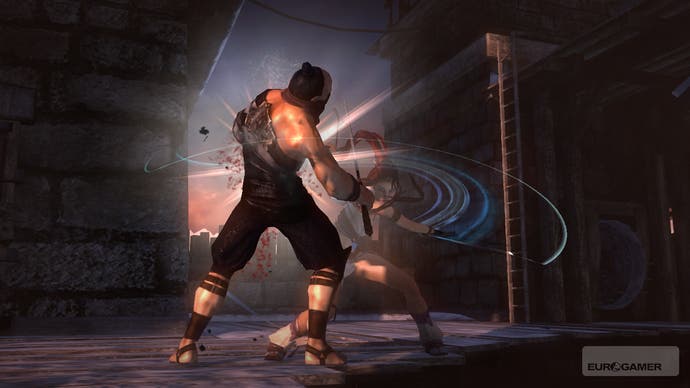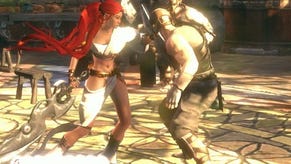Heavenly Sword
Sevenly flawed.
Wonder Milky Bitch
Part of the problem is the way Heavenly Sword rewards progress. Every game from possibly Onimusha onwards has gravitated towards a variation on the genius orb/soul harvesting system, which ensures players have a means to power up weapons/powers/armour as they see fit. This allows players to subtly change the experience to suit them, and how they want the game's 'currency' to be invested - for example, spread thinly across all abilities and weapons, or towards maxing one in particular. However, Ninja Theory's decision to go for a predetermined approach is baffling, because it leaves the player with no means of controlling or varying how Nariko powers up over the course of the game.
Perhaps only having one weapon (the Heavenly Sword) is a bit of an oversight in a genre that relies on the variety and intrigue provided by new and increasingly powerful attack methods and, likewise, defence mechanisms. All the game offers in return for your concerted efforts is new combos when you accumulate medals during each sub-level. To a degree there's a incentive to go back and replay levels you didn't do so well on to earn new combos, but only if you're capable of working out these new moves afterwards. For the vast majority of players, that's no real incentive - not when good old fashioned button mashing does the job just fine (on Normal difficulty, I might add - the unlockable Hell mode's a different story, in as much as it'll kick your arse if you don't know exactly what you're doing).
Another thing to take issue with is whether the counter system is a good idea at all. What's wrong with being able to block, for example? If anything, the rather lame auto block system merely encourages you to wade in like a maniac and thrash around until everyone's lying prostate on the ground. If you could block, it would encourage a bit more strategy, but instead it feels like a never ending sequence of attacks - it's not as if there aren't enough spare buttons to make it possible. On the whole, the control system just makes the game feel more hemmed in than other hackandslashers - which, we suspect is precisely the opposite of what Ninja Theory was aiming for. It might make it more accessible on the surface, but you just feel constrained.
Instant replay
It's a real shame to reflect on that, because in all other respects the game gets things just right. The bite-sized structure (and the ability to replay each and every segment afterwards) is a great touch, and keeps the action flowing like a good action blockbuster should. The camera, as well, is exceptionally well executed, and is never something you need to worry about, because (like God of War) the levels are designed intelligently enough to take all of that away from you. Instead of having to control the camera with the right stick, it pans around exactly when it should, leaving you with the option to use the right stick to pull of a nifty evasion move. If peering in a specific direction is that important to you, L2 and R2 give you that ability - not that you ever really need to, but sometimes you might just like to admire the view...

Now and then Heavenly Sword takes a break from all the hackandslash guff and lets you shoot at things from big cannons, or fire arrows into the mush of one of those sneaky archers stationed up in the ramparts. In these hugely entertaining (but rather samey) interludes you can aim the rough direction and trajectory with the left stick and fire haplessly with the square button (and invariably miss), or hold down L1 and effectively steer the missile directly to its target. By default, the game encourages you to use the SixAxis tilt controls, but although it feels rather fantastic when you wobble your pad to your target, it's horribly imprecise. After a few hours of struggling with it, we couldn't quite believe how much easier it was to control the direction with the analogue stick in comparison. Nice try, but no thanks. Inevitably, after you've played through a couple of these shoot 'em up sections, the novelty wears off a little and it starts to feel a bit tacked-on, but that's not to say they weren't enjoyable. At the very least, they show off the gore, the excellent explosions and the game's frankly superb physics in an incredibly cinematic fashion.
On that last point we should perhaps elaborate. In keeping with the exceptional technical graphical feats, the way all the game's objects have a convincing physical property is genuinely impressive. Objects splinter and break apart, structures collapse and debris knocks other items asunder. Every scene is truly alive with destruction, and the ability to grab hold of practically anything and lob it at an enemy is great fun. But, as with so many of the other impressive technical feats in the game, it only seems to make the central gameplay flaws more apparent, sadly. In short, it looks pretty, but never really utilises the physics to do anything in real gameplay terms.
Picky

But that's not to say the game is totally glitch free, either. In fact, on regular occasions it's glaringly apparent that Heavenly Sword isn't quite as optimised as it could have been, with notable frame rate hitches creeping in now and them, and occasional v-sync tearing. As polished as the game is 90 per cent of the time, there's a lingering feeling the game was deemed 'good enough' rather than fully honed in all areas. That's a real shame, because it brings us back to thinking about how good the game might have been had the developer been given a few more months to tweak, refine and change a few things that might have made all the difference.
As it stands, Heavenly Sword is still an impressive, epic hackandslash adventure, and one that's full of memorable moments that keep you engaged right to the end. At times it veers towards being truly great, with the general 'direction' of the game's key sequences ensuring that it always keeps your attention with one visually arresting sequence after another. But inevitably, no amount of lavish technical polish and drama-filled cut scenes can disguise how it feels to play, and the fact that at its core, the combat doesn't quite cut it. Put simply, it feels like it's trying too hard to be different for the sake of it, and throws all manner of good, well-established ideas out to its detriment. Instead of being a spectacular refinement of what's gone before, Heavenly Sword is a reinvention that doesn't quite pay-off. Not quite the 7th heaven you might have been looking for, then.













